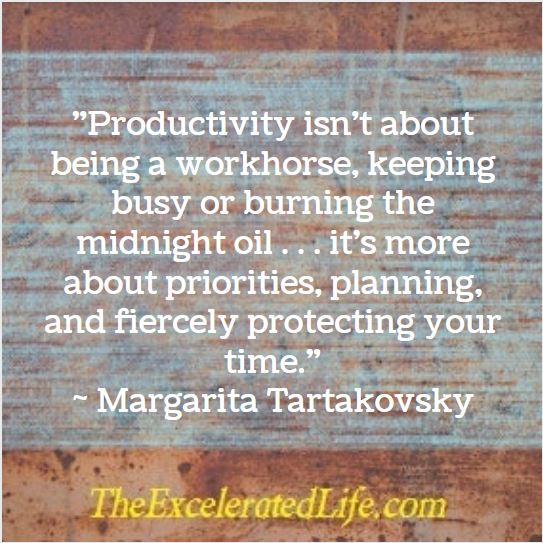“In the end, putting together a life of extraordinary results simply comes down to getting the most out of what you do, when what you do matters. Living for productivity produces extraordinary results.” ~ Gary Keller, The ONE Thing
Living for productivity produces extraordinary results. What sort of results have you been achieving? Would you call them “extraordinary”? If I am honest with myself, most of my days are not extraordinarily productive — although I am having more productive days lately, thanks to the information I am sharing with you in this post. In his book, The ONE Thing: The surprisingly simple truth behind extraordinary results, Gary Keller contends that “the most successful people are the most productive people.” [Keller 158] And the most productive people are those people who spend the maximum amount of their time on their top priority – their “ONE Thing”.
Find your ONE thing.
So what’s your “ONE Thing”? Keller stumbled upon his ONE Thing by focusing on the answer to this question: “What’s the ONE thing you can do this week such that by doing it everything else would be easier or unnecessary?” [Keller 9] Consider the so-called 80 / 20 rule. This rule states that 80% of our results come from 20% of our efforts. (This is an approximation. The true ratio may be 80/20, or 90/10 or 75/25 or 60/40. The point is that the majority of your results come from doing only a few things.) If 20% of your efforts account for the majority of your accomplishments, doesn’t it make sense to spend even more time on the 20%?
Here are some ideas to help you decide on and spend time on your most important tasks – the thing, hopefully the ONE Thing, that allows you to be your most productive.
Time Blocks
1. Use Time Blocks. Time blocks are appointments you make with yourself. The aim is to make these as non-violable as any important appointments you have with other people. Of course you want to block out time on your calendar for your highest priority task. But Keller also advocates blocking out your time off – this is the first thing he blocks off. So you are planning your other high-priority activities around your time off. In addition to time off and time blocks for your high-priority tasks, block out planning time – at least one hour per week to review your yearly and monthly goals.
2. Protect your time blocks from yourself and from others. Get in the habit of treating these blocks as important as any other appointments. If someone wants your attention or your presence during your time block, just say you have an important appointment that you can’t miss (which is true). A bigger challenge may be to protect your time blocks from all the little distractions – e-mail, social media, surfing the internet – that can get you off course and use up much of your time before you even become aware of it. You may also need to tackle and over come procrastination (of which much has been written about before).
Choose event time over clock time
3. Use “event time” – when the work is done – vs. “clock time”, when the work day is “over”. Consider how a farmer works. She doesn’t start at 8:00 AM and stop at 5:00 PM. She starts when the chores have to be done – animals fed and so forth. And she quits when she has completed all the jobs that must be done today. Can you imagine the farmer postponing planting her crops till she “feels like it”? In the words of the old almanac: “Prune when the knife is sharp.” The farmer doesn’t knock off work at 5:00 PM each day. She stops when the work for the day is done. Let us emulate the farmer and work by “event time” instead of “clock time”.
Prioritize and focus on results
4. Set your priorities each day by deciding what is the #1 thing you need to do today. Use Keller’s Focusing Question: “What’s the ONE thing you can do today such that by doing it everything else would be easier or unnecessary?” Once you have your #1 priority, you’re ready to get to it. Where do you ultimately want to go? That determines what you do today.
5. Focus on results, not methods. Many people look for pleasing methods and don’t give much thought to the results. Look for pleasing results – i.e., how you can live out your purpose — and use what ever methods are at hand. Keep trying different methods if necessary until you get the results you want.
The reason to be more productive
The people who are truly successful in creating the lives they want have a knack for getting things done. They understand that intention must be matched by action and they set about doing the things that move them forward. They also know that the purpose of improving productivity is not about getting even more things done but about freeing up time to spend with the ones they love while they do the things that help fulfill their purpose. And that is embracing the Excelerated Life!
* * * * * * * * * * * * * * * * * * * * * * * * * * * * * * * * * * * * * * * * * * * * * * * * * *
Excelerated productivity — improving efficiency and effectiveness– is one step in creating your Excelerated Life, a life of well-being, meaning, and purpose.
Keller, Gary with Jay Papasan. The ONE Thing: The Suprisingly Simple Truth Behind Extraordinay Results. Austin, TX: Bard Press, 2012


